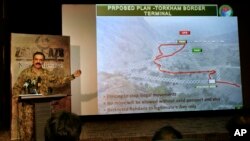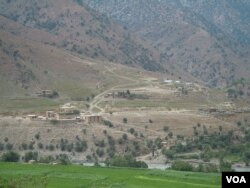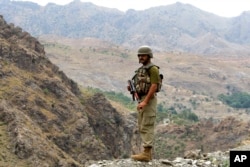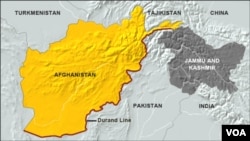Pakistan says it has completed construction of “20 percent” of outposts being established along a largely porous border with Afghanistan, and called for the strife-torn country to take matching steps for deterring terrorist infiltration.
The two uneasy neighbors share a nearly 2,600 kilometer rugged mountainous frontier, called the Durand Line, with several hundred irregular crossing points, facilitating movements of militants and smugglers in both directions.
Army spokesman Lt. General General Asim Bajwa, told reporters in the northwestern city of Peshawar that regular and paramilitary soldiers have also been deployed at some of the newly-built installations located in high mountain passes.
“The soldiers are now firmly positioned there, effectively blocking any movement from Afghanistan into Pakistan, and similarly no one can cross over the border from this side,” he asserted.
Afghan authorities have long alleged Taliban insurgents affiliated militant groups plot and stage cross-border attacks using sanctuaries on Pakistani soil.
Officials in Islamabad reject the charges and blame the porous border as well as decades old localities housing millions of Afghan refugees for sheltering the insurgents.
Bajwa said border management efforts are mostly underway on the Pakistani side. “They will most effective when Afghan security forces occupy positions on their side. We hope that in coming days there will be more forces deployed on the other side so both countries can benefit from these measures.”
Afghanistan disputes the Durand Line demarcation put in place by former British rulers of the Indian subcontinent and opposes Pakistani plans of building permanent structures on the border.
Islamabad dismisses those concerns and says Pakistan inherited the frontier after it gained independence from Britain in 1947. It has vowed to speedily implement its “border management” measures, saying it will also help address mutual terrorism concerns.
The determination to strengthen border security despite Kabul’s objections stems from allegations the Afghan intelligence agency is sheltering and facilitating anti-Pakistan militants to conduct terrorist attacks on Pakistani territory, charges Afghan officials deny.
General Bajwa asserted probes into this month’s terrorist attacks in Peshawar and the nearby city of Mardan have concluded they were planned in Afghanistan. He added “female facilitators”, now under detention along with several other suspects, also played a role in the violence, but gave no further details.
“Details of these incidents are being shared at all levels with (NATO’s) Resolute Support mission [in Afghanistan], with the Afghan government, with the Afghan military and with their intelligence to the extent it is possible,” Bajwa said.
Both countries regularly blame each other for supporting violent attacks on their respective territories, fueling bilateral tensions.
U.S. military commander General John Nicholson last week reiterated Washington's concerns Islamabad is not putting "adequate pressure" on the Haqqani Network of militants fighting along side the Taliban insurgency in Afghanistan, to prevent them from staging cross-border attacks.







